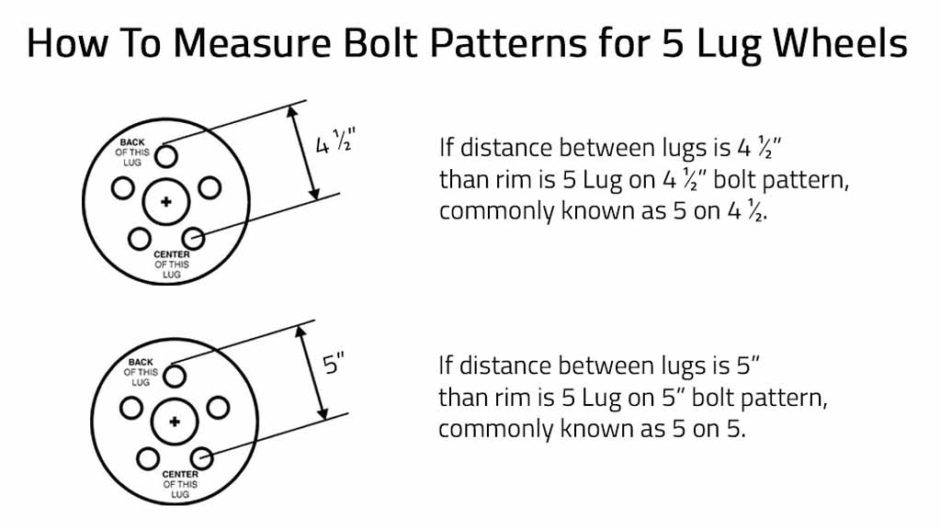Decoding Your Wheels: A Guide to Measuring Tire Rim Bolt Patterns
Ever stared at your car's wheels and wondered about that mysterious bolt pattern? It's more than just a design feature – it’s crucial for safe driving. Knowing how to decipher this code is essential for anyone who owns a car, from seasoned mechanics to first-time drivers. This guide will break down the art of measuring tire rim bolt patterns, empowering you to choose the right wheels and ensuring a smooth, safe ride.
Imagine buying a set of stylish new wheels only to discover they won't fit your car. Measuring your bolt pattern beforehand prevents this frustrating scenario. The bolt pattern, also known as the lug pattern, is essentially the arrangement of the bolts or studs that secure your wheel to the hub. A correct match is vital for proper weight distribution and stability.
The history of bolt patterns is intertwined with the evolution of the automobile itself. As cars became more complex, so did their wheel assemblies. Standardized bolt patterns emerged as a necessity for compatibility and safety. Knowing how to determine your vehicle's specific pattern helps maintain this crucial link to automotive history and engineering.
The importance of correctly measuring your bolt pattern can't be overstated. An incorrect fitment can lead to vibrations, premature tire wear, and even wheel detachment, posing serious safety risks. Understanding this measurement ensures proper wheel alignment and handling, keeping you safe on the road.
Getting the bolt pattern wrong isn't just an inconvenience; it's a safety hazard. It can compromise the structural integrity of the wheel assembly, potentially leading to accidents. This guide will empower you to avoid such risks by providing the knowledge and tools to measure accurately.
The bolt pattern is typically expressed as two numbers. The first number represents the number of lugs or bolts. The second number represents the diameter of the circle formed by the center of those lugs. For example, a 5x114.3 bolt pattern indicates five lugs with a circle diameter of 114.3 millimeters.
A simple example is a car with a 5x100 bolt pattern. This means the wheel has five lugs and the circle connecting their centers measures 100mm. Knowing this allows you to choose compatible replacement wheels.
Benefit 1: Safety: Accurate measurement ensures proper wheel fitment, preventing potential accidents caused by loose or detached wheels.
Benefit 2: Performance: Correctly fitted wheels improve handling, stability, and overall vehicle performance.
Benefit 3: Tire Longevity: Proper fitment minimizes stress on tires, leading to even wear and extended tire life.
Step-by-step guide for measuring a 5-lug pattern: Measure from the center of one lug hole to the center of the lug hole directly across from it. For 4-lug patterns, measure diagonally across the center of the wheel.
Step-by-step guide for measuring a 4-lug pattern: Measure diagonally across the center of the wheel, from the center of one lug hole to the center of the opposite lug hole.
Checklist:
1. Identify the number of lugs.
2. Measure the diameter as described above.
3. Compare your measurements with available wheel specifications.
Advantages and Disadvantages of Measuring Your Own Bolt Pattern
| Advantages | Disadvantages |
|---|---|
| Saves time and money by avoiding incorrect purchases. | Requires some basic tools and understanding. |
| Empowers you to make informed decisions about wheel selection. | Measurements can be slightly inaccurate if not done carefully. |
Best Practices:
1. Use a precise measuring tool, preferably a digital caliper.
2. Double-check your measurements for accuracy.
3. Consult your vehicle's owner's manual for confirmation.
4. If uncertain, seek professional assistance from a tire shop.
5. Never assume compatibility based on visual inspection alone.
FAQs:
1. What if I can't find my bolt pattern information? - Check your owner's manual or consult a tire professional.
2. Are there different measuring techniques for different lug patterns? - Yes, the method varies slightly between even and odd numbered lug patterns.
3. Can I use a ruler instead of a caliper? - A ruler can be used, but a caliper provides more accurate measurements.
4. What if my measurements don't match any standard bolt patterns? - Double-check your work, or consult a professional.
5. Is it difficult to measure a bolt pattern? - With the right tools and guidance, it's a straightforward process.
6. Why is the bolt pattern so important? - It ensures a secure connection between the wheel and the vehicle, crucial for safety.
7. Can I change my car's bolt pattern? - This is generally not recommended and requires significant modifications.
8. Where can I find compatible wheels once I know my bolt pattern? - Tire shops and online retailers offer wheels based on bolt pattern specifications.
Tips and Tricks: Clean the mounting surface of the wheel hub before measuring for increased accuracy. If you’re unsure about your measurements, it’s always best to consult a tire professional.
Understanding how to measure your tire rim bolt pattern is a fundamental aspect of car ownership. It empowers you to make informed decisions about wheel selection, ensures proper fitment for optimal performance and safety, and contributes to the overall longevity of your tires. This seemingly small detail plays a large role in your driving experience. By taking the time to learn this skill, you’re investing in a safer, smoother, and more enjoyable ride. Don’t rely on guesswork – equip yourself with the knowledge and tools to measure accurately, ensuring your wheels are always securely attached and ready for the road ahead. Take control of your car's safety and performance by mastering this essential skill. You'll thank yourself for it down the road.
Small tattoo stencils for women a delicate touch of art
Unlocking hvac efficiency herm explained
Nectar adjustable beds near you a snarky guide












